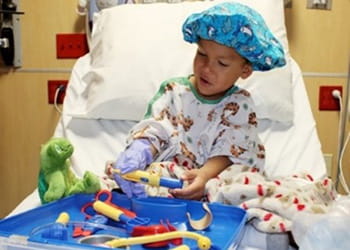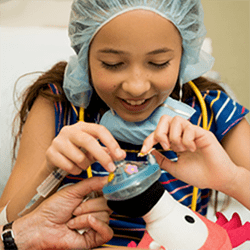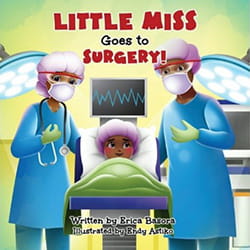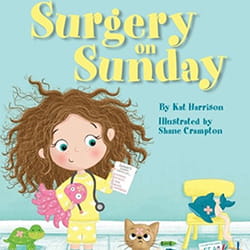The idea of surgery and hospitalization can be frightening and overwhelming for any child. As a caregiver, it’s important to remember that your child looks to you for reassurance. Listed below are tips and advice to help you prepare your child with age appropriate information before surgery.
Resources on How to Prepare Your Child For Anesthesia by Age
- Coming to the hospital for surgery can be stressful for infants/toddler. Some common stressors may include separation from caregivers and their home environment, new unfamiliar people, thirst and hunger from not eating, overstimulated (new sounds, smells, tastes, sights, sensations), disruption to normal routines, and interrupted sleep.
- You can prepare for surgery by keeping baby’s routine as normal as possible to be well rested, both you and baby. Read books (book list provided below) about surgery and play “doctor” with toy medical kits on stuffed animals, dolls/action figures to help your child practice and prepare for what to expect.
- As a caregiver, you can support by bringing the baby’s favorite security item to the hospital. A familiar blanket, stuffed animal, or pacifier will make the baby more comfortable. Not eating and drinking before surgery can be difficult. Plan to bring pacifiers or teethers for soothing and comfort. Try to stay calm and relaxed as your emotions can often reflect onto your child.
- Coming to the hospital for surgery can be stressful for preschoolers. Some common stressors may include being separated from caregiver, meeting unfamiliar people, worrying about getting shots and pokes, going into a strange and unfamiliar environment, medical equipment that looks and sounds scary, they did something wrong to cause surgery / view surgery as punishment.
- You can prepare for surgery by explaining what will happen in the days before surgery. When explaining surgery, you can say: "The doctors will give you special sleepy air so they can help fix or help your body feel better.” Help your child understand the reason for surgery. For example, if your child is having their tonsils removed, you might say that surgery will help your child have fewer sore throats or breathe better at night. Read books (book list provided below) about surgery and play “doctor” with toy medical kits on stuffed animals, dolls/action figures to help your child practice and prepare for what to expect.
- As a caregiver, you can support by bringing your child’s favorite item, such as a stuffed animal or a security blanket, with you to the hospital. Try to stay calm and relaxed as your emotions can often reflect onto your child.
- Coming to the hospital for surgery can be stressful for school aged children. Some common stressors may include being away from family, home, pets, school, and friends, thinking they are in the hospital because they are bad or are being punished, having a part of the body injured, loss of control, pain (or the possibility of pain), worrying about needing a shot, worrying about waking up during surgery or dying.
- You can prepare for surgery by explaining what will happen in the days before surgery. When explaining surgery, you can say: "The doctors will give you special sleepy air so they can help fix your body.” Help your child understand the reason for surgery. For example, if your child is having their tonsils removed, you might say that surgery will help your child have fewer sore throats or breathe better at night.
- As a caregiver you can support by having the child help pack their bag (if staying overnight) or bring any comfort items like a blanket, stuffed animal, fidget toy, tablet, games, etc. that they enjoy with them. Also, you can encourage the child to ask questions of the doctors, nurses, or child life specialist. Try to stay calm and relaxed as your emotions can often reflect onto your child.
- Coming to the hospital for surgery can be stressful for teens. Some common stressors may include separation from peers and school, change in body appearance/image (i.e scars), loss of independence, and invasion of privacy.
- You can prepare your teen for surgery by including them in pre-operative conversations and planning with the medical team and ensuring they have opportunities to ask any questions they may have. It is helpful to tell your teen they will be getting an IV (small plastic straw in their arm) for the anesthesia medicine.
- As a caregiver, you can support by having your teen bring a phone, tablet, music/headphones, a fidget toy, games etc. to play to help distract them. Teens may not want to talk a lot about surgery but letting them know you are available to talk about it allows them to talk through it if they want.










